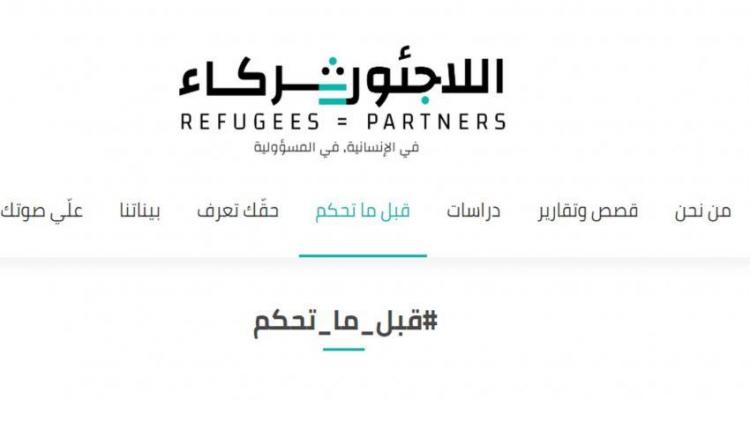A Media Initiative in Lebanon in Trying to Break the Stereotype of the Refugees
A Media Initiative in Lebanon in Trying to Break the Stereotype of the Refugees
It is no secret that the Syrian refugee in Lebanon is being languished under physical pressure attached to war and asylum, but there are moral pressures attached to a reality that can’t be denied by the Lebanese, which is the racist attitude towards the refugees.
The researcher in Lebanon about the models of stereotyping discourse, whether on the political level, media or street speech doesn’t strain much in his research, it is enough to put the phrase “racism against the Syrian refugees in Lebanon” on Google’s engine and one can see the links and models confirmed that.
Lebanon Doesn’t Consider Itself an Asylum Country
“Arbitrary policies, discriminatory regulations and practices implemented by the Lebanese government and local municipalities respectively, violate international refugee and human rights law”, according to Human Rights Watch (2018), if we want to justify these practices, it is that, Lebanon considers itself a corridor state not a permanent place for the refugees as a whole.
The Lebanese government rejects the integration of Syrian refugees into society, as affirmed in the 2014 report on the Convention of the Elimination of All Forms of Discrimination against Women which states that “Lebanon doesn’t sign the 1951 International Convention on Refugees because it doesn’t consider itself an asylum country.”
Lebanese Media doesn’t Adopt a Balanced Approach to the Refugees
The absence of a clear legal framework of the Lebanese government towards its approach to the file of the Syrian asylum at a time the economic and social crises are crumbling the Lebanese, created a fertile environment for demonizing Syrian displacement and burdening Lebanon with the load of the crises hit Lebanon to the extent that a Lebanese television prepared a report linking the high rate of cancer with Syrian refugees.
“It is hard to consider the Lebanese and Arabic media as a professional independent body, therefore we see that all the problems and the mistakes of political discourse have its reflections on media performance.” Lebanese journalist Diana Moqalled told North Press about the role of media in stereotyping refugees.

“This doesn’t absolve the media from its responsibility in perpetuating and generalize the negative image, but to understand where the media decline comes from, we have to notice who owns the media and in the midst of which culture the new journalists work.” She added.
Regarding the rise of the populist movement in the world that adopts an anti-immigration and asylum speech, specifically in Europe and the United States, Moqalled believes that “Media approach in Lebanon grabs strength from the shoveled trend of the extreme populist rightist in the world because what is happening in Lebanon is consistent with this trend and strengthens with it surely”.
“I don’t think that this reflects the whole image, because the attempts to reject and resist this discourse are still present, albeit in an unorganized but effective way and it can disturb and convey the message even by unconventional means.” Moqalled added.
Embrasure
In November 2018, an unprecedented research media initiative was launched in Lebanon under the title “Refugees = Partners”, aimed at countering negative feelings against refugees in Lebanon and encouraging reform of the policies that protect their rights.
The project focuses on breaking stereotypes against Syrian refugees through in-depth research and informative materials disseminated on social media.
The project revealed the gap between generalized decisions on refugees and real numbers on the ground through a series of “Before you Judge” info-graphics. For example, the dominant impression among Lebanese is that Syrian workers are taking over their jobs, while “refugees = partners” reveals that 84% of Syrian labor in Lebanon are in the agricultural and constructional sectors which are allowed under Lebanese labor law since the crisis.

“The crisis of the Syrian refugees in Lebanon is being handled from a purely political point of view at a time there isn’t any legal framework about this file. I think the problem is that the refugees came to a country that lacks to social justice with the citizens themselves, so how is it be with the refugees?” said Fatima Ibrahim, director of the project to North Press.
“We discovered that most of the organizations concerned with refugees issues carry out their research, but their numbers and results remain out of the reach of the public and the media,” Fatima said. “We have worked on a positive media campaign based on research and facts at a time hatred speech prevails.”
“The stereotypes about refugees aren’t based on real figures. For example, a time before now, a politician shared an information saying that the average of Syrian births have exceeded 300,000 births during a year. Unfortunately, such information has a large proportion of spreading among society.”
Beirut – NPA

